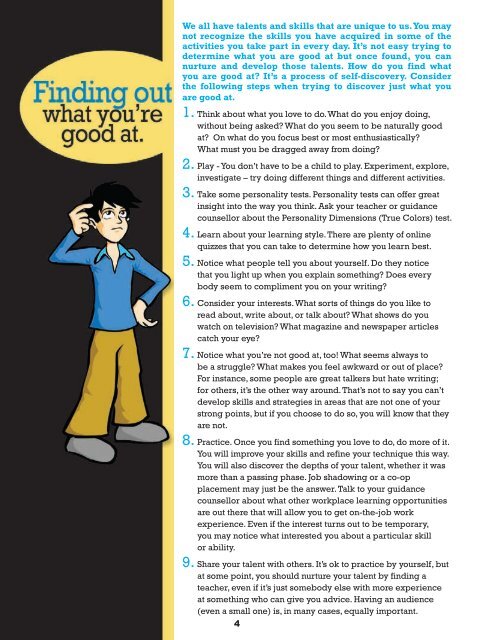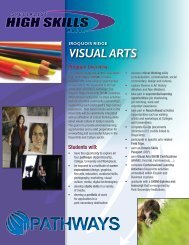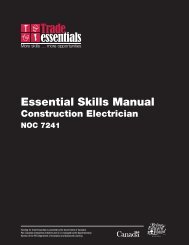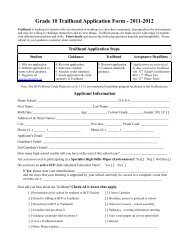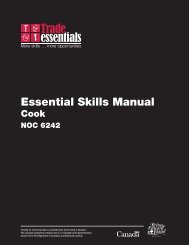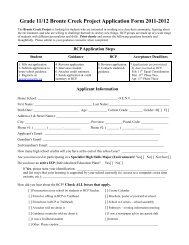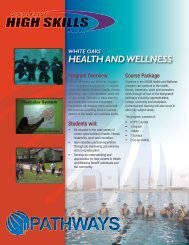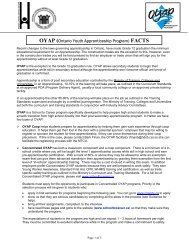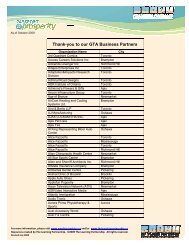PURSUITS 2011! - Business Education Council of Niagara
PURSUITS 2011! - Business Education Council of Niagara
PURSUITS 2011! - Business Education Council of Niagara
You also want an ePaper? Increase the reach of your titles
YUMPU automatically turns print PDFs into web optimized ePapers that Google loves.
We all have talents and skills that are unique to us. You may<br />
not recognize the skills you have acquired in some <strong>of</strong> the<br />
activities you take part in every day. It’s not easy trying to<br />
determine what you are good at but once found, you can<br />
nurture and develop those talents. How do you find what<br />
you are good at It’s a process <strong>of</strong> self-discovery. Consider<br />
the following steps when trying to discover just what you<br />
are good at.<br />
1. Think about what you love to do. What do you enjoy doing,<br />
without being asked What do you seem to be naturally good<br />
at On what do you focus best or most enthusiastically<br />
What must you be dragged away from doing<br />
2. Play - You don’t have to be a child to play. Experiment, explore,<br />
investigate – try doing different things and different activities.<br />
3. Take some personality tests. Personality tests can <strong>of</strong>fer great<br />
insight into the way you think. Ask your teacher or guidance<br />
counsellor about the Personality Dimensions (True Colors) test.<br />
4. Learn about your learning style. There are plenty <strong>of</strong> online<br />
quizzes that you can take to determine how you learn best.<br />
5. Notice what people tell you about yourself. Do they notice<br />
that you light up when you explain something Does every<br />
body seem to compliment you on your writing<br />
6. Consider your interests. What sorts <strong>of</strong> things do you like to<br />
read about, write about, or talk about What shows do you<br />
watch on television What magazine and newspaper articles<br />
catch your eye<br />
7. Notice what you’re not good at, too! What seems always to<br />
be a struggle What makes you feel awkward or out <strong>of</strong> place<br />
For instance, some people are great talkers but hate writing;<br />
for others, it’s the other way around. That’s not to say you can’t<br />
develop skills and strategies in areas that are not one <strong>of</strong> your<br />
strong points, but if you choose to do so, you will know that they<br />
are not.<br />
8. Practice. Once you find something you love to do, do more <strong>of</strong> it.<br />
You will improve your skills and refine your technique this way.<br />
You will also discover the depths <strong>of</strong> your talent, whether it was<br />
more than a passing phase. Job shadowing or a co-op<br />
placement may just be the answer. Talk to your guidance<br />
counsellor about what other workplace learning opportunities<br />
are out there that will allow you to get on-the-job work<br />
experience. Even if the interest turns out to be temporary,<br />
you may notice what interested you about a particular skill<br />
or ability.<br />
9. Share your talent with others. It’s ok to practice by yourself, but<br />
at some point, you should nurture your talent by finding a<br />
teacher, even if it’s just somebody else with more experience<br />
at something who can give you advice. Having an audience<br />
(even a small one) is, in many cases, equally important.<br />
4


